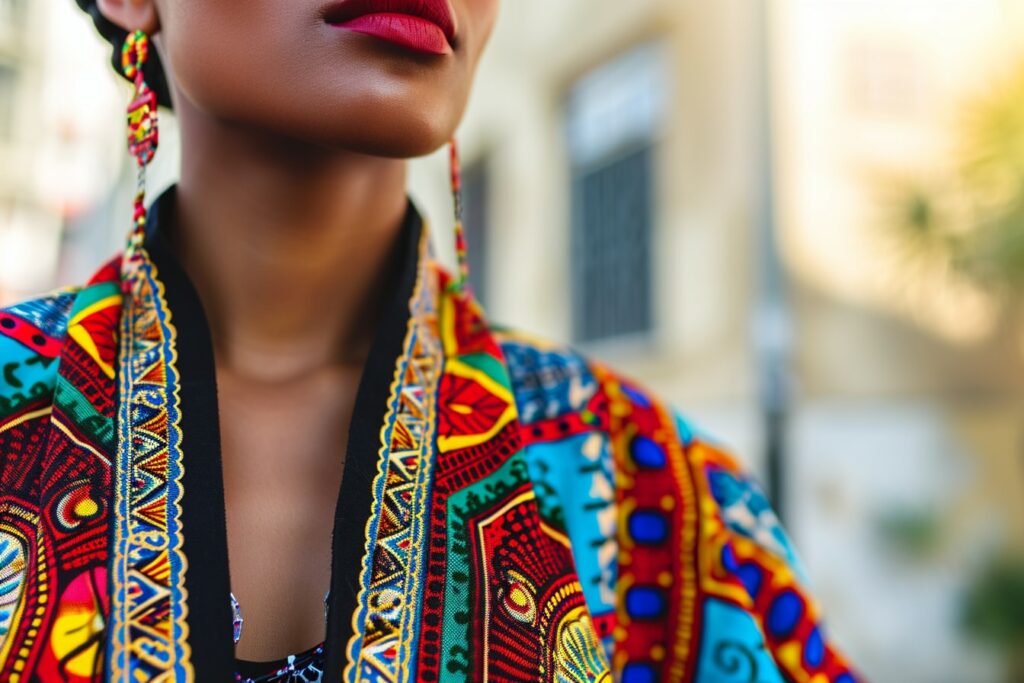African women’s fashion has been booming in recent years, and no wonder! With their diverse and varied styles, African designers are showcasing the beauty of women around the world. Their designs combine tradition and modernity to offer exceptional outfits that tell the story of the culture and heritage of a continent rich in color and flavor. Our media Africa Fashion Tour takes you on a tour of African African fashion ( African men’s fashion, African fashion designers, African fashion shows, dresses in African fashion…) and highlights emerging talents.
African fashion must-haves for women
This trend became popular with the use of emblematic fabrics, such as Wax, Ankara or tribal motifs. As a result, some flagship pieces have emerged to capture the hearts of many fashionistas around the globe:
- The boubou: This ample dress originated in West Africa and symbolizes the elegance and nobility of its wearers. Sumptuous African embroidery often adorns this unique piece.
- Wax skirts and dresses: Wax is a colorful, printed African fabric that is all the rage when it comes to skirts and dresses, both among the stars and on the trendy streets of our cities.
- High-waisted pants: Drawing inspiration from the 80s, this piece is back with a vengeance and delightfully adorned with tribal motifs for a fresh, sparkling look.

The rise of African designers: a revolution in African women’s fashion
In recent years, a wind of renewal has been blowing through African women’s fashionA new generation of talented designers is redefining the codes of African feminine style. These women designers, often trained between Africa and the West, breathe a bold modernity into African women’s clothingby combining traditional textiles with contemporary cuts.
Among them, figures such as Lisa Folawiyo (Nigeria), Sarah Diouf (Senegal) and Christie Brown (Ghana) are making their mark on the international scene with collections that celebrate African identity while meeting the expectations of modern women. Their creations revisit classics such as the boubou, the wax dress or the loincloth skirt, incorporating minimalist design elements, asymmetrical cuts and couture details.
These designers are also committed to an ethical approach, valuing local know-how and collaborating with artisans to make their pieces. This approach contributes to more sustainable and responsible fashion, while offering women African outfits for women that combine aesthetics and commitment.
The influence of these designers extends beyond the continent’s borders. Their modern african women’s clothing are attracting an international clientele in search of authenticity and uniqueness. Fashion shows in Paris, London and New York now welcome these African talents, testifying to the growing recognition of their work.
By putting the spotlight on these designers, we are witnessing a veritable revolution in African women’s fashion. African women’s fashionwhere innovation and tradition coexist harmoniously. Their success is inspiring a new generation of women to embrace their cultural heritage while asserting their individuality through African women’s clothing unique and contemporary.
African designers making a difference
With their singular approach to style and fashion, many African designers are making a name for themselves on the international scene. Designers are redoubling their imagination to offer ever more daring collections, sublimating the female body:
- Deola Sagoe has made a name for herself with her luxurious creations using Aso Oke fabric, traditionally reserved for weddings and ceremonies.
- South African Laduma Ngxokolo is renowned for her designs featuring sleek, feminine silhouettes inspired by her Xhosa cultural heritage.
The role of influencers in promoting African women’s fashion
The rise of the internet and social networks has given players in African women’s fashion the opportunity to promote their creations to a wider audience. A number of influencers have taken a stand in support of African fashion and put the spotlight on local designers:
- Folake Huntoon, a Nigerian blogger based in the USA, uses her platform to share the latest trends and deciphers what’s new in African women’s fashion every season.
- Actress Lupita Nyong’o, a true style icon, doesn’t hesitate to wear African outfits to prestigious events and red carpet events, promoting this fashion that is still too little known by the general public.
Combining tradition and modernity: the challenge facing African designers
African designers have developed a unique style by blending contemporary influences with elements from their own culture. This alchemy has given rise to ever more innovative pieces, combining details and ancestral techniques:
- African embroidery: This artisanal know-how lives on in the creation of garments and accessories with fouta, batik or kuba motifs.
- Weaving: Artisan weavers use natural fibers such as cotton, raffia or linen to make traditional textiles that serve as the basis for sumptuous pieces.
Applying these traditional skills to contemporary creations
In order to reinvent their creations, designers integrate these traditional methods into the manufacture of their garments, while adapting to today’s market:
- The use of Wax, an essential fabric in African women’s fashion, is reflected in modern, tailored cuts.
- Ancestral embroidery skills are given new impetus through the use of metallic threads or pearls, adding a contemporary touch to the designs.
Sustainable development and African women’s fashion: towards a more responsible industry
Faced with environmental and social challenges, players in the African women’s fashion industry are increasingly committed to sustainable development. Initiatives are springing up to promote an ethical and respectful industry:
- Promoting traditional techniques that consume fewer natural resources and encourage local work.
- Creation of eco-responsible collections featuring organic, recycled and fair-trade materials.
There’s no denying that African women’s fashion continues to evolve and seduce. Between tradition and modernity, designers continue to surprise, offering an innovative and enchanting vision of African style. Are you passionate about African fashion and want to stay in touch with the latest trends? Subscribe to the Africa Fashion Tour newsletter to make sure you don’t miss a thing! You can also contribute to the growth of African fashion with partnerships tailored to your objectives. Take the first step towards a rewarding collaboration by contacting our media.
